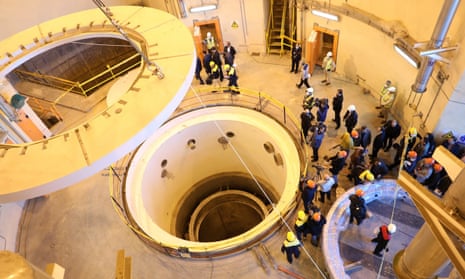France, Germany and the UK must move quickly to set out a roadmap for Iran and the incoming Biden administration in the US to come back into compliance with the nuclear deal, some of Europe’s leading diplomats have said.
They warn that unless the three countries, known as the E3, coordinate a joint public statement setting out what both sides must do to end the impasse, there is a real risk that Joe Biden will come to power facing only escalating tensions with Iran.
The statement has been signed by the former UK Middle East minister Alistair Burt; the former Swedish prime minister Carl Bildt; Wolfgang Ischinger, the former German ambassador to the US; Jean-David Levitte, the former French ambassador to the US; the former Nato secretary general Javier Solana; and the former Polish foreign minister Andrzej Olechowski.
It underlines the urgency felt in parts of Europe that the momentum towards potential reconciliation, signalled by Biden’s election, risks being disrupted by those determined to ensure that the US and Iran cannot get back to the negotiating table, and instead end up in a dangerous round of escalation. That fear has grown with the assassination of the Iranian nuclear scientist Mohsen Fakhrizadeh.
On Monday it was announced that the remaining signatories to the nuclear deal – France, Germany, the UK, Russia, Iran and China – will meet at joint commission level in Vienna on 16 December to discuss how to keep the deal alive.
The diplomats hope their roadmap, and the key role given to Europe to act as a mediator, can be picked up at that meeting and help overcome the sequencing difficulties that face any reopening of the negotiations.
The statement, coordinated by the European Council on Foreign Relations, urges the E3 to call first on the Biden administration, once inaugurated, to announce that the US will rejoin the nuclear deal, and then for the US and Iran to agree on steps for mutual recompliance.
The E3 countries should press for a joint commission meeting of the current parties to the deal to be held prior to 20 January, the date of Biden’s inauguration, it says.
At that meeting, the EU’s high representative, Josep Borrell, should, as chair of the joint commission, encourage the members of the agreement to call for the return of the US to the deal, and for the US to reaffirm support for the UN security council resolution 2231, the resolution that lifts sanctions on Iran.
“The joint commission should also call on the United States to reissue waivers for civil nuclear cooperation [revoked under Trump] as soon as possible to facilitate Iran’s roll-back of nuclear activities and the modernisation of Iran’s Arak heavy water reactor,” the statement says.
“Between now and 20 January, the E3 and the EU should scope out a clear pathway for Iran to reverse its nuclear activities. Europeans should stress to Iran that such steps will be a necessary component for the United States to fully return to the [deal] under a Biden administration.
“This process should involve an extensive discussion with Iran on technical steps to roll back its nuclear programme, the realistic contours of sanctions relief under a Biden administration, and European measures to support Iran’s economy. The E3 and the EU should also use existing diplomatic channels with Iran to caution against escalation with the United States, particularly in Iraq where there is a high risk of tensions. Any escalation in advance of Biden’s inauguration would greatly complicate diplomatic efforts.”
Before Biden’s inauguration, the diplomats propose that European governments should also intensify contacts in the US Congress and with countries hostile to the deal, notably Israel, Saudi Arabia and the United Arab Emirates. One aim would be to reassure the hostile states that there are advantages to them of reviving the deal, including possible stabilisation efforts in Iraq and Yemen.
